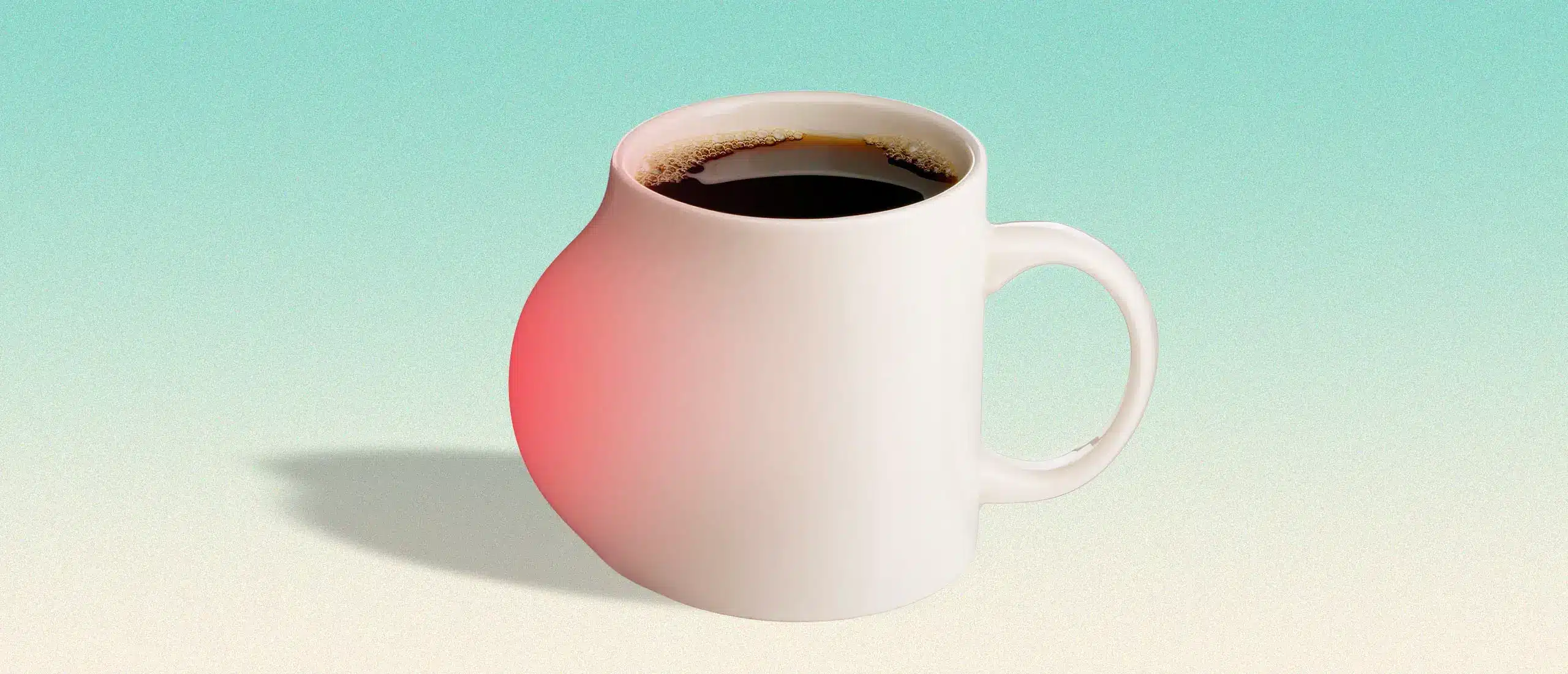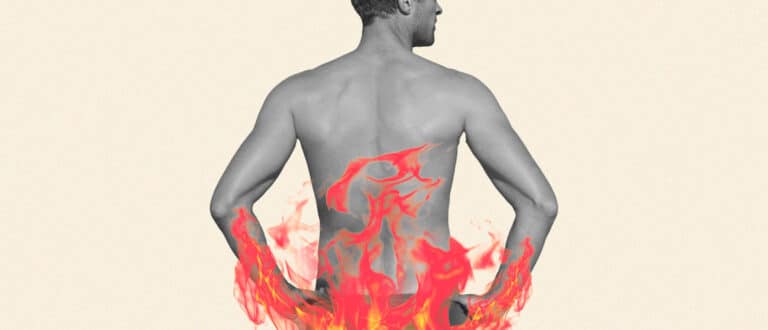Why Does Coffee Sometimes Cause Inflammation?
- By Sydney Bueckert, NASM C.P.T., C.E.S., F.N.S., G.P.T.S.
- April 25, 2023
- REVIEWED BY IMASHI FERNANDO, M.S., R.D.
Fast Facts
- Coffee is rich in anti-inflammatory polyphenols which aid in reducing inflammation
- Coffee with sugar and milk has health benefits, but sugar is inflammatory, so stick to natural sweeteners
- Caffeine can contribute to inflammation by messing with natural cortisol levels and sleep
- Drink it two to three hours after waking, and stop drinking it four to six hours before bed to reduce inflammation
If your list of guilty pleasures includes Diet Coke, In-N-Out french fries, pizza, tequila, and never-ending amounts of coffee, hi, we are now best friends.
We’re all human; we all crave a cheat meal and stuff that we know isn’t the best for us. And that’s unfortunately true of the above list.
Why? Sugar, alcohol, and processed foods cause inflammation (1, 2, 3, 4)—which has been linked to everything from heart disease and arthritis, to erectile dysfunction and low testosterone. Sad facts that are enough to keep us away (most of the time).
What about coffee? We often peg it as a vice, but is coffee bad for you? And does coffee cause inflammation? Registered dietitian Imashi Fernando, MS, RD explains.
Does Coffee Cause Inflammation?
It’s complicated. “Coffee beans are packed with a variety of different antioxidants and other health-promoting plant compounds, which play an important role in your body to neutralize inflammatory free radicals,” says Fernando, “thereby, lowering systemic inflammation.” Points for coffee lovers.
Regular coffee consumption is linked to lower inflammatory markers found in the blood (5). Plus, those who drink coffee regularly have a lower risk of Alzheimer’s, Parkinson’s, type 2 diabetes, gout, heart disease, and some cancers—all manifestations of chronic inflammation—per a review published in British Medical Journal (6).
These benefits stem from over 1,000 bioactive compounds found in coffee—including polyphenols (6). Polyphenols could specifically improve a handful of inflammatory markers, including cytokines, chemokines, and basic fibroblast growth factor, per a study published in Cancer Epidemiology, Biomarkers, and Prevention (7). Bonus: the researchers found the more coffee people drank, the greater the impact.
However, the effect of coffee on inflammation largely depends on your body’s response to caffeine, Fernando points out.
“Some people are more sensitive to caffeine than others,” she says, “this is, in part, due to how quickly your body is able to break down caffeine. Some break it down faster than others.” If you metabolize coffee slowly, one study suggests you might have an increased risk for cardiovascular disease including heart attacks (8).
“Regardless of your predisposition to caffeine, it can spike cortisol levels,” says Fernando. Cortisol is anti-inflammatory by nature, but prolonged levels can have the opposite effect, contributing to chronic inflammation (9).
It can also disrupt your sleep (10); however, getting a good night’s sleep is essential for a healthy inflammatory response (11).
“It’s important to listen to your body, and seek to understand how it responds to caffeine,” says Fernando. “Stress, anxiety, and poor sleep are all clues that coffee might be doing more harm than good, and you might need to adjust your coffee intake accordingly.”
What About Coffee With Sugar, Cream, or Milk?
How you take your coffee—cream, sugar, regular, decaf—matters for benefits, according to Fernando. “If you’re someone who adds a ton of sugar, it’s best to start weaning off of it,” Fernando advises. “Natural sweeteners, like monk fruit or stevia, are a better choice.”
Drinking coffee—even with sugar—was associated with a lower risk of death, suggest the findings of a recent study (12). However, excessive sugar is a known cause of inflammation in the body (13).
On the other hand, “adding a splash of cream, half and half, milk, or milk alternative is no big deal,” says Fernando. Many point the finger at dairy as a cause of inflammation; however, it may have neutral to beneficial effects on inflammation, according to a recent review (14).
Plus, adding dairy to your cup of coffee might actually help to reduce inflammation levels, suggests the findings of a recent study published by The Journal of Agricultural and Food Chemistry (15). It found, when paired with the polyphenols in coffee, amino acids in milk had a protective effect against inflammation in immune cells.
Which Coffee is Most Beneficial: Decaf or Regular?
Great news for those who struggle with caffeine: “Decaf coffee offers comparable health benefits to regular coffee (16),” says Fernando. That’s because caffeine isn’t the major contributor to the anti-inflammatory benefits of coffee, it’s the polyphenols (7).
If you struggle with caffeine, consider this your cue to make the switch to decaf. “If you don’t have a problem with caffeine, there’s no reason to avoid regular coffee,” says Fernando, “but it’s important to drink it in the right window to work with your body’s natural cortisol levels and sleep cycle.”
Your cortisol levels are typically highest in the morning, due to the cortisol awakening response—which peaks 30 minutes after waking up (17). “There is some thought that drinking coffee first thing out of bed may interfere with your body’s ability to regulate cortisol balance,” says Fernando. “Instead, try drinking regular coffee two to three hours after waking.”
She also recommends having your last cup of regular coffee at least four to six hours before bed to promote quality sleep. “If you prefer coffee before or after, you can always sub in decaf,” she adds.
How Much Coffee to Drink for Benefits?
There’s no clear consensus. “There is a lot of variation in studies as to what the optimal amount of coffee to drink for full anti-inflammatory benefits is,” Fernando says. “Most studies have seen beneficial effects with two or more cups of coffee daily.”
She notes the USDA recommends limiting daily caffeine intake to no more than 400 milligrams per day, which is about four eight-ounce cups of coffee (18).
One recent review found that three to four cups of coffee per day is associated with several benefits, and is considered generally safe for healthy adults (19). “However, if you experience nausea, upset stomach, increased heart rate, jitters, and anxiousness it’s a sign you’ve had too much caffeine,” Fernando says.
References
1. Ma, X. et al (2022). Excessive intake of sugar: An accomplice of inflammation. https://www.ncbi.nlm.nih.gov/pmc/articles/PMC9471313/
2. Bishehsari, F. et al (2017). Alcohol and Gut-Derived Inflammation. https://www.ncbi.nlm.nih.gov/pmc/articles/PMC5513683/
3. Narula, N. et al (2021). Association of ultra-processed food intake with risk of inflammatory bowel disease: prospective cohort study. https://www.bmj.com/content/374/bmj.n1554
4. Mignogna, C. et al (2022). The inflammatory potential of the diet as a link between food processing and low-grade inflammation: An analysis on 21,315 participants to the Moli-sani study. https://pubmed.ncbi.nlm.nih.gov/36081297/
5. Paiva, C. et al (2019). Consumption of coffee or caffeine and serum concentration of inflammatory markers: A systematic review. https://pubmed.ncbi.nlm.nih.gov/28967799/
6. Poole, R. et al (2017). Coffee consumption and health: umbrella review of meta-analyses of multiple health outcomes. https://www.ncbi.nlm.nih.gov/pmc/articles/PMC5696634/
7. Loftfield, E. et al (2015). Associations of coffee drinking with systemic immune and inflammatory markers. https://www.ncbi.nlm.nih.gov/pmc/articles/PMC4490956/
8. Cornelius, M. et al (2006). Coffee, CYP1A2 Genotype, and Risk of Myocardial Infarction. https://jamanetwork.com/journals/jama/fullarticle/202502
9. Hannibal, K. et al (2014). Chronic Stress, Cortisol Dysfunction, and Pain: A Psychoneuroendocrine Rationale for Stress Management and Pain Rehabilitation. https://www.ncbi.nlm.nih.gov/pmc/articles/PMC4263906/
10. O’Callaghan, F. et al (2018). Effects of caffeine on sleep quality and daytime functioning. https://www.ncbi.nlm.nih.gov/pmc/articles/PMC6292246/
11. Irwin, M. et al (2016). Sleep Disturbance, Sleep Duration, and Inflammation: A Systematic Review and Meta-Analysis of Cohort Studies and Experimental Sleep Deprivation. https://www.ncbi.nlm.nih.gov/pmc/articles/PMC4666828/
12. Liu, D. et al (2022). Association of Sugar-Sweetened, Artificially Sweetened, and Unsweetened Coffee Consumption With All-Cause and Cause-Specific Mortality. https://www.acpjournals.org/doi/10.7326/M21-2977
13. Bordoni, A. et al (2015). Dairy Products and Inflammation: A Review of the Clinical Evidence. https://www.tandfonline.com/doi/full/10.1080/10408398.2014.967385
14. Liu, J. et al (2023). Phenolic Acid—Amino Acid Adducts Exert Distinct Immunomodulatory Effects in macrophages Compared to Parent Phenolic Acids. https://pubs.acs.org/doi/10.1021/acs.jafc.2c06658
15. Elder, G. et al (2014). The cortisol awakening response—Applications and implications for sleep medicine. https://www.sciencedirect.com/science/article/abs/pii/S1087079213000518?via%3Dihub
16. Food and Drug Administration (2018). https://www.fda.gov/consumers/consumer-updates/spilling-beans-how-much-caffeine-too-much
17. Nieber, K. et al (2017). The Impact of Coffee on Health. https://pubmed.ncbi.nlm.nih.gov/28675917/














